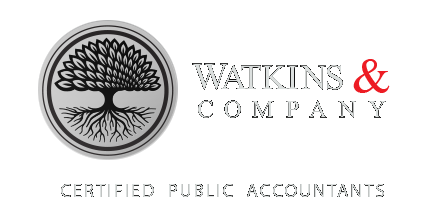Tax Planning And Compliance For Small Businesses
Owning a small business is potentially one of the most rewarding experiences in life but can also present a fair share of challenges. You have to learn to wear many different hats, one of which is tax and compliance planner. Proper tax planning and compliance have a significant impact on your business’s financial growth and the longevity of your company. Yet keeping up with ever-changing tax laws and regulations can be overwhelming, especially when you’re already juggling the day-to-day operations of your business.
We have good news for you! Tax professionals at Watkins & Co are here to share everything you need to know about tax planning and compliance for small businesses, as well as how our team can assist you in this crucial aspect of your business.
Small Business Tax Planning Strategies
We get many questions from business owners, such as, what are my tax obligations as a small business? How do I do a tax plan for my business? What are the most common types of tax requirements for small businesses? If you’re asking questions like these, then you’re already on the right track! With small business tax planning, thinking ahead makes all the difference! Don’t wait until the end of the year to start considering taxes, as you will likely miss opportunities for deductions and credits. Successful tax planning includes understanding your tax obligations, monitoring your financials and accurate record keeping, identifying areas in which you can reduce tax liability and noncompliance, and paying taxes promptly.

Tax Obligations for Small Businesses
The first step to proper tax planning is understanding the specific tax obligations required for your small business that differ from those of individuals. The types of taxes you’ll pay depend largely upon the structure of your business, which may be an LLC, sole proprietor, corporation, partnership, or S corporation. Each business structure requires different taxes and may have differing deduction and payment options, so you’ll need to identify which taxes you’re responsible for paying and when those are due. Business taxes are often area-specific and may include income tax, estimated tax payments, employment tax, excise tax, franchise tax, self-employment tax, and sales tax, among others.
Maintaining Accurate Records
One of the most crucial aspects of small business tax planning is maintaining accurate financial and tax records. This reduces the chances of errors and penalties when filing tax returns. To do so, purchase or create a system that accurately records financial reports, monitors tax payments, maintains employment tax records, and so on. A professional tax team, like Watkins & Co, can provide you with financial statements and reports for regulatory and organizational authorities to steer away from potential problems with regulatory entities, government tax organizations, and investors.
Staying Current on Tax Regulations & Compliance
One of the most difficult tasks of being a small business owner is staying compliant with business tax laws and regulations that are constantly changing. Staying informed about the latest changes or updates to tax regulations can help you avoid expensive penalties or legal action against your company. Part of tax compliance is ensuring that you are properly filing all necessary tax returns and making required tax payments for small businesses on time. If you’d like professional assistance with this, our local Jackson tax planning and compliance team can keep you updated on the latest tax laws and regulations in your region that may impact your business, as well as preparing, planning, and filing your tax returns to avoid penalties and maintain regulatory compliance.
Best CPAs for Tax Planning, Jackson, MS
Whether it’s understanding the latest tax laws or seeking professional tax assistance, Watkins & Co understands your needs and is here to help you navigate the complex world of tax planning and compliance. Our goal is to arm you with knowledge and support so you can focus on what you love most: running your business. Contact us today to set up a consultation!






You must be logged in to post a comment.